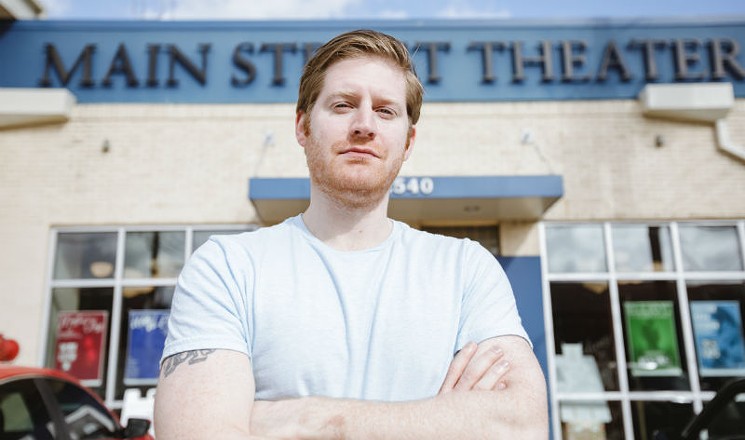If that sounds familiar it might be because you saw almost this exact story played out on the Alley Theatre stage in their recent production of Fully Committed. A play about a financially struggling actor (starring Dylan Godwin) working his tush off as a reservation taker for a posh New York restaurant. The show’s premise makes for great comedy, but it also ding-dongs loud with the truth. Actors need side jobs to get by.
And not just any job. A workable part-time gig for an actor includes things like decent pay (one Houston actor we spoke to said he’d be lucky to make $5K a year from his acting jobs), flexible hours, the ability to take off to go to auditions and a boss who doesn’t mind that you may come in a little tired because you got off stage late and home even later.
This must-have list can lead to some unusual, awful and downright dramatic types of side gigs. But you know what they say about crazy experiences, they make for good stories, and the Houston actors we spoke with had some doozies they were happy to share.

Necessity turned out to be the mother of invention on Weir's creative resume.
Photo by David "Odiwams" Wright
But there was a catch. He had to have experience fixing large office-style printers. “I figured a paper jam is an easy fix, no problem,” says Weir. “So, in the interview, they ask for my experience and I tell them that I used to help a buddy of mine out at his dad’s work and they fix printers which was half true as they did fix printers but I never had anything to do with it.”
Weir’s first day on the job consisted of secretly watching hours and hours of YouTube videos on how to fix printers. And it was going well, Weir was considered the Printer Fairy, able to solve all their mechanical issues. But there was a looming potential problem. There was very special printer on the 25th floor that he had no idea how to repair. “There were ZERO videos on this printer,” says Weir who prayed it never malfunctioned.
“However, three months in and it did. The place darn near had a meltdown because I couldn't fix it in two days.”
Eventually, Weir, with the help of a friend, found a manual and repaired the machine. All was well once again.
However, after nine months the company was forced to downsize and Weir was first to get the ax. “On my exit review I was asked plainly, 'Is this you?' And they presented me a video of a commercial I had done,” says Weir. “I said 'Yes.' The next question was, 'You’ve never worked with printers before this job, have you?' And I let the cat out of the bag. If anything, they were impressed. They, however, did not write me a recommendation for my next job, which I consider calling it even.”

A pipeline job kept Galino grounded and afloat till he got to do Othello at the Alley Theatre.
Photo by David "Odiwams" Wright
The litany of side jobs held down by Luis Galindo as he was launching his acting career are as scrappy as they are diverse – stagehand, grocery store stocker, law firm clerk, offshore oil rig worker, sandblaster, painter, bartender, and rock-climbing wall builder, just to name a few.
Some of these jobs were great, some not so much, and you can bet that Galindo has stories from every one of them, but it's the exchange that happened on a pipeline job that really sticks out.
“I actually loved the pipeline work deep down because I could channel the working-class hero archetype and live it, which I did for a few years, that is until I got a gig at the Alley doing Othello,” says Galindo. “My last day was a cold and rainy late-January day. We were laying pipe along the banks of the Colorado River near Wharton and I was in mud up to my knees all damned day.
"The backhoe operator was a rather corpulent man with arms like sides of pork and a voice that sounded like a chain-smoking prepubescent boy dashed with unintelligible mumbling and fits of heavy wheezing. He was a giant redneck with a baby's voice. His name was Big Dennis. Big Dennis, who was only liberal when it came to the use of profanity, racial slurs, and homophobic epithets. Our final conversation went something like this:
BD: (Think of a voice that would not be unlike Tom Waits being mimicked by a 13-year-old girl) Louie, why the F&^k are you leavin' the good pipeline?
Me: I'm going to work in the theater, it's what I was trained for.
BD: What are you gonna do? Work with all them twinkle-toes and wear tights and stuff.
Me: Yup. I am going to work on one of the greatest plays ever written by the best writer who ever lived.
BD: Who's the best writer that ever lived?
Me: William F*&%ing Shakespeare.
BD: Well now, I don't know about all that, I mean… (baby voice grumbling)
Me: All right, I'll bite, who is the best writer that ever lived?
BD: Fu&^%ing Louie L'Amour!!"
Unfortunately for many female actors, side jobs often involve using the way you look to make a buck. Long before #MeToo, Jennifer Decker (who went on to co-found Mildred’s Umbrella, a feminist theater company) got a small taste of the kind of unwanted male attention that now is finally being called out and condemned.
“I had a talent agent who was supposed to get me acting jobs, but mostly sent people on jobs for alcohol promotions,” says Decker. “They would send girls to give away free things at bars and events wearing cocktail dresses or evening gowns. But one time we had to dress up like cheerleaders at the drag races to promote Winston cigarettes.
"I was one of the cheerleaders, and my job was to help drunk men get into a simulator ride so they could pretend like they were driving a race car. I was groped about 20 different times by men who smelled like beer and chewing tobacco, and one guy threw up on my shoes.”
To add insult to injury, Decker’s flimsy cheerleading outfit was no match for the winter weather outside, leaving her cold on top of being insulted, angry and vomit-covered. “That’s when I quit that job and finished college. That agent never got me any real acting jobs. I just got them on my own, and rarely got paid more than gas money because there wasn’t a lot of paying theater work in Houston back then. Now, it’s different.”

If Teresa Zimmermann ever gets a part in a vampire play, she can call on her draining, money-making experience giving plasma.
Photo by David "Odiwams" Wright
When Teresa Zimmermann’s restaurant job cut her lunch shift (the only shift she could handle due to her rehearsal schedule) she needed cash and needed it fast. Her then boyfriend/now fiancé had an idea: plasma donation.
“He had done it a few times while he was in California (where he was also a fellow broke actor), and I found a clinic about 30 minutes away”, says Zimmermann. “I did it three times. They get you by saying they'll pay you something like $100 for the first donation, but after that, it's according to how much you can donate, which all depends on size., At 5'3" and a buck-thirty, I wasn't exactly a plasma farm, so I think I ended up getting $25-50 per donation.”
The first few times went all right. Zimmermann completed the screening tests and donated without incident. The last time, however, didn't go so well. "I was going over my music for the musical I was in at the time, and suddenly, I was not OK,” says Zimmerman. “The music in my headphones felt very far away, and somehow very scary. My face went cold and I realized I was on my way to passing out.”
Zimmermann tried to get a nurse’s attention, but the words wouldn’t form and all she could do was groan. “I remember the man next to me started laughing, toothlessly, at me with a mix of 'Aw, she's passing out for the first time,' and 'Buckle up; you're going down,'" says Zimmerman. “I woke up with a trash bag on my chest in case I got sick. My sheet music was on the floor. They put an ice pack on my head, gave me some juice, and I left when I felt less shaky. I went to rehearsal after that and never donated again.”

Proving there are happy endings: Seán Patrick Judge found the dream side job for an actor - because he is an actor.
Photo by David "Odiwams" Wright
Now of course in an article like this we're going to give you the funniest, most outrageous or downright awful side gig stories we could. But that's not to say that every actor we spoke with had bad or odd experiences trying to find and keep part-time work. Many say they like their non-acting jobs. But in an almost reversal of course, Seán Patrick Judge not only loves his part-time gig, but he landed the position because of his acting.
“I met this neuroscientist about 16 years ago who was dating a woman in a theater company I was working with. We hit it off and he started coming to every single play I ever did,” says Judge. “About eight years ago, I was complaining about my corporate job making it impossible to do theater any more, and he was complaining about not having enough help managing his burgeoning career, so I became his assistant, with the incredible flexibility to go to auditions, be in rehearsals during the day, all kinds of things you just do not get in the 'real world.' I often say I feel like I got a patron, like artists used to have centuries ago.”
Like their side gigs, hate them, pass out from them, the thing to take away is that all but a fortunate few actors have to supplement their income somehow. Think about that the next time you’re enjoying a play or a musical. Those talented men and women who work so hard to entertain us aren’t just working their butts off on stage. They’re doing it off stage as well. And they do it for the love of theater.
If that isn’t worth a bravo, I don’t know what is.








